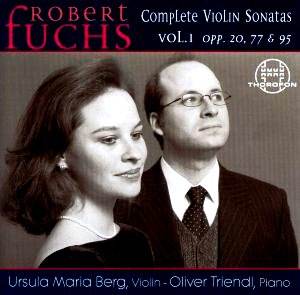The Styrian-born Fuchs was associated with the Brahms
fraternity in Vienna. His name might well be familiar as the teacher
of Ernst Decsey, Sibelius, Korngold, Zemlinsky, Schreker and Wolf. His
music has tended to fall into the deep background. Given the virtues
of these sonatas this is a pity.
There are six violin sonatas in all. The last was written
in 1919 to a world torn asunder from the Viennese contentment in which
he had immersed himself from his early manhood. The 1877 First Sonata
is a contented Brahmsian essay of surprising and emotional reach.
An ambitiously lyrical allegro moderato leads to a silvery songful
andante sostenuto which makes way for a jog-trot allegro con
fuoco. While I greatly enjoyed the polished febrile edginess of
Berg's violin I wondered if the finale should have gone with more spleen.
The 'song' continues unabated in the similarly three movement Fourth
Sonata. This took me back to the singing violin sonatas of Othmar
Schoeck (on
Guild). Fuchs can be quite fastidious and elegant as in the finale
of Op. 95. Strangely enough Fuchs several times had me thinking of Saint-Saëns
and Stanford both in Op. 77 and Op. 95. Treindl's piano is warmly recorded
and a justly agreeable balance is struck with Berg's violin. This is
music impelled by the urge to sing. Fuchs was not the sort of revolutionary
we find in Nielsen (e.g. his piano pieces). Instead he had a genius
apt to a language long established by Brahms and then Schumann.
The programme notes are helpful if too taken up with
technical musical description.
Fuchs, though living well into the last century, had
his roots struck deep into the mulch of nineteenth century German romanticism.
I hope that we can hear more of his freshly envisioned music from Thorofon
both in volume 2 of this series and in the orchestral music (two discs
from Thorofon).
This disc is most beautifully done. I am intent on
hearing more Fuchs as soon as I can.
Rob Barnett
